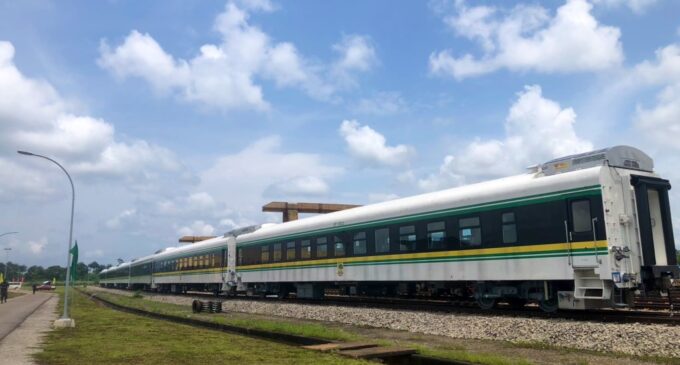Kano to Maradi Rail-line: A microeconomics analysis

There were speculations surrounding the Nigerian government’s intention to follow up the protectionist policy imposed upon agricultural importation back in 2019 with another one upon textiles and co. products. The speculations, whether bearing any resourceful cogency or otherwise, had rattled questions regarding the impact the policy could have upon one of the biggest retailing economies in the country, and by far the largest textiles marketplace in Africa – Kano state – which would be the most affected when the policy comes into being. Kano is a retailing rendezvous that heavily relies on importation of textiles to employ its frightening population, attract a lucrative foreign and domestic investment and keep the economic tire of the entire economy rolling by keeping the banking and transportation departments busy.
And though from a locally-deduced data it was agreed that the Nigerian textiles industry hasn’t grown the capacity to adequately supply the gargantuan demand of the marketplace of Kano (In 2009 a daily transactions record reached 9 billion Naira) – therefore a protectionist policy would only cut off the employment generation and cripple other economic opportunities provided by the retailing might which’ll definitely dwarf the Kano state economy in no time – the main worrying factor exuded by the prospect of protectionist policy goes beyond the immediate consequences. And that’ll be the desolution of the retailing goodwill enjoyed by the marketplace of Kano, which will have to circumstantially be shared with other African marketplaces in textiles-consuming foreign economies of Niger, Ghana, Cameroon and Republic of Benin.
But with the protectionist policy on textiles industry now out of question, a native trading viewpoint will agree that a rail-line connection with neighboring subshaharan countries will help in retaining Kano state’s retailing goodwill and consolidate both the macro and microeconomic benefits that are holding the Kano state economy together, which are also immensely defending upon the ecosystem and dynamics of the mentioned countries. The rail-line was commissioned by the federal government in January, 2021.
Fun Fact
Common knowledge its that every single shipment coming to Nigeria is stationed at Lagos. But so uncommon its to know that if a Lagosian wants to buy as little as a roll of foreign fabric that’s shipped from China or India he’ll have to travel all the way from Lagos to Kano to purchase it. For that’s where the owners of the fabric, who were initially Kano inhabitants, would agree to unpack their shipment. And the same would have to be done by a Ghanaian who could’ve stayed in a much closer Lagos to buy or a trader from Benin Republic.
Market is where the buyer goes. And that’s what the Kano market forces exploited to execute such visionary decision that ensures they bring the unloading, the unpacking and the retailing jobs to Kano. While also stretching buyers to travel as far as the northwest to watch with their own eyes the investment potentials of the marketplace. Which has proven very successful.
Some of the early textiles traders grew extremely impressed by the crowd the Kantin Kwari market was able to pull off, and to counter the impression they went on a land purchasing spree in an effort to own as much stake in the ever-rising in stake and value marketplace. Some of those textiles traders are famously from Sokoto, many from Katsina and a very large population of them from the Yoruba and Igbo lands, all in Federal Republic of Nigeria. And beyond that, a reputed bandwagon of traders from Niamey, Damagran and Maradi states of Niger Republic own houses and shops, with as many others from Ghana, Cameroon and Republic of Benin. And their reputation in the markets speak for itself.
The Marketplace Goodwill Effect
The growing might of Kano economy as a textiles marketplace reaches the level where an importer from Niger Republic would rather redirect his shipment to Kano than home to his own country. The reason is that when some of those traders tried taking the shipments to their home countries and towns the buyers would refuse to buy against the suspicion of price exploitation and the mischief of counterfeit, and so they have to come to Kano. So whether by choice or force, Kano remains the chosen marketplace. By the virtue of fame, reputation and goodwill. Incredibly attractive to potential investors and importers, from wherever in the subshahara.
Therefore its in the information of Kano retailers that if protectionist policy gets imposed to ban importation of textiles to protect the local industries, before the Nigerian textiles industry reaches maturity Kano will lose its retailing goodwill. For the foreigners who are established in Kano because their own countrymen wouldn’t buy from them until they come to Kano will finally have the chance to redirect their focus home since importation wouldn’t be banned there. That way, a formerly-stubborn Maradi trader from Niger would have no choice but to buy from his own Niger importer who knows the way to China and India. The unpacking and unloading and all the jobs generated in the process would now fly back to Niger; both to showcase absence of dominant marketplace and to established easier retailing route to their home economies. The same thing would be done by the established Ghanaians, Cameroonians and Chadians.
Along the line, Kano would be isolated and crushed into bankruptcy with its frightening population unemployed. The retailing goodwill will be gone to the neighboring and offshore economies. The state and local governments would lose internal revenues. And that’ll cut off the economic breath of local artisans who make a living in tailoring, driving, unloading and unpacking.
In 2009, the then chairman of Kantin Kwari market, Alh. Bature Abdulaziz disclosed that Kantin kwari market alone records a daily transactions that wouldn’t supersede 9 billion Naira. And even though so much of the marketing flow was wounded by the adventure of Boko Haram, the figures can only surge higher after twelve years. In essence, a protectionist policy would have been a generational disaster. Thanks to God it has never been considered. Just like as much gratitude shall be given for the advent of the said rail-line.
Maradi to Kano Rail-line
From the angle of macroeconomics, there is a very strong international trade between northern Nigeria and the Maradi-Matameye-Damagaran-Doso-Niamey axis. Maradi and Damagaran are unquestionable consumers of Kano-retailed textiles. And in return they produce locally-produced shoes for teenagers and adults, and a boiled soya beans milk. Matameye and Doso have proven reliable defenders upon the soft drinks and consumables that are also produced and retailed in Kano, in return for a really well-agreed to be good livestock. And Niamey is a new environment through which northerners, especially the people from Kano, import education and export skilled labour in university lecturers and professors.
A rail-line in Maradi, being the inhabitant of the border linking Nigeria with Niger from the boundary of Katsina will be a gamechanging project that’ll pave way for the beginning of smooth economic link that has come through a rewarding geographically-distanced endurance. The sociocultural exchange of marriage and kinship notwithstanding, the move will leverage the coexistence of two unique economies, with Nigeria running away with far superior benefits in higher receipts than payments.
A rail-line from Kano to Maradi means traders from Katsina who come to Kano and those who go to Katsina from Kano, will have an easy route. Likewise the traders from Katsina to Maradi and from Maradi to Katsina. The project will also kick-start a further linking of Maradi with other native states in Niger Republic. And the underlying ends of the effort remains the creation of easy accessibility to market, which resides in northern Nigeria. More investors from Niger who have given in to the retailing goodwill of Kano will flow to drop off their shipments and buy more land to expand the textiles marketplace. And that’ll mean further employment and inflation of goodwill. While the livestock importers, food and consumables exporters from northern Nigeria will have an easy route to fly their trade in Niger.
The Maradi to Kano rail-line has the potential to be the single most important win-win project since the textiles big boys agreed to unpack only in the Kantin Kwari plaza. And an average inhabitant of Kano metropolis has that decision to thank for a significant aspect of his standard of living. In another very important note, a decision of similar magnitude should be considered on other rail-lines linking the northern axis with Chad and Cameroon. That way, the consolidation of our marketplace goodwill will take effect, and that’ll turnout the biggest asset the northern Nigeria owns, especially Kano. And in the event that the local textiles industries reach maturity, warranting a protectionist policy, the incentive will only rise by providing accommodation to both market and industry, courtesy of goodwill that’s cemented by easy transport. Thanks to a rail-line. So its all smiles looking ahead to the future.
The economic households who fear for the fate of their trades in case the retailing goodwill gets dissolved will be calmed by the security the rail-line will provide. The same calmness will hug the institution of government for the security of revenue and employment. A rail-line from Kano to Maradi could mean different things to different people. But to a Kano household with a good grasp of basic economics, its an overwhelming economic security project.
Iliasu is an economic and public affairs analyst who writes from the ancient metropolis of Kano. He can be reached through his email: [email protected].
Views expressed by contributors are strictly personal and not of TheCable.
















There are no comments at the moment, do you want to add one?
Write a comment